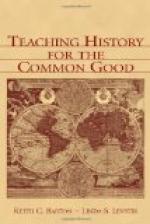THE USE OF WRITTEN REPORTS
The purpose of theme work should change as the course continues
A method frequently employed by teachers of history is to require written reports or themes on various phases of the history as the work progresses. This plan is particularly valuable for the students in the first two years of high school history, for the reason that their library requirements are less exacting and their need of fluency greater during that time than later in their course. The objects of theme work in history courses are usually to arouse the pupil’s powers of observation, description, and narration, and to provide means of drill in the exercise of these powers. These should not be the sole purposes of theme work, however. As the year advances, an increasing amount of the written work should be on subjects requiring some generalization or analysis of the facts brought out in the text or in the recitation. The pupil who has written a theme describing the appearance of the Pyramids has completed an exercise in history less valuable than that of the student who writes a theme on the errors of the Athenian Democracy.
To summarize, reviews in history should consist of both oral and written work; they should be rapid enough to insure quick thinking, alert attention, and small expenditure of time; they should occur with increasing frequency as the year advances; they should stock the memory, fix in the student’s mind the order of events, stimulate fluency, insure a permanent acquaintance with the personnel of history, and give to the student a better view of the subject as a whole and in its various phases.
VII
EXAMINATIONS AS TESTS OF PROGRESS
The examination should determine how much the student has progressed
The time is coming, if it is not already here, when the public will cry out against the nervous fear and sleepless nights with which their children approach the semi-annual torture of our inquisitorial examinations. That reasonable examinations are essential and beneficial is hardly open to question. That a student should be expected correctly to answer a fair percentage of reasonable questions on work which has been properly taught is not a cause of complaint from anyone. But that children should be frightened into a state of nervous terror by the bugaboo of an impending examination, and then be forced to attempt a series of conundrums propounded by a teacher who takes pride in maintaining a high percentage of failures, is indefensible. An examination should not be conducted with the primary object of making it a thing to be feared. However desirable such a questionable asset may seem to certain college professors, it is a serious fault in a high school teacher to have any considerable number of normal children fail. The ambition of the good instructor is to give an examination which shall at once be thorough, reasonable, and intelligently directed toward finding what the student has really learned. His purpose is to test accurately the various abilities which he has endeavored to encourage in the student during his course. He wishes to ascertain how much the student has really progressed.




